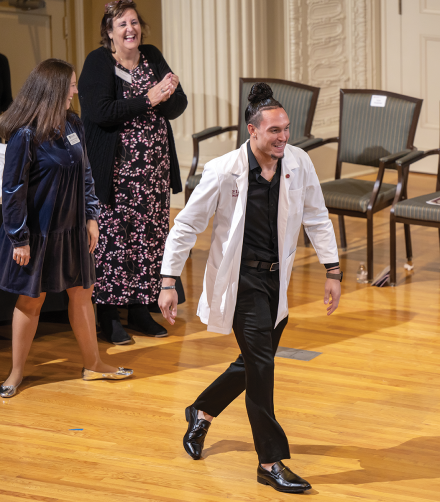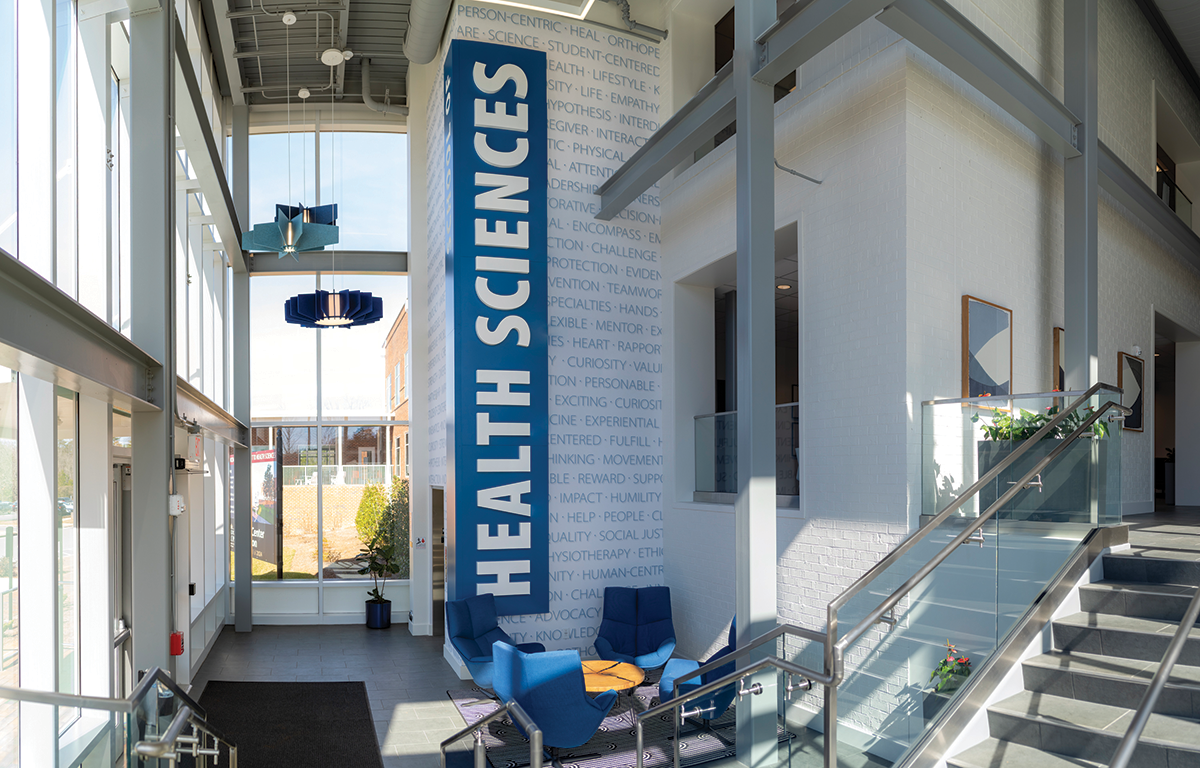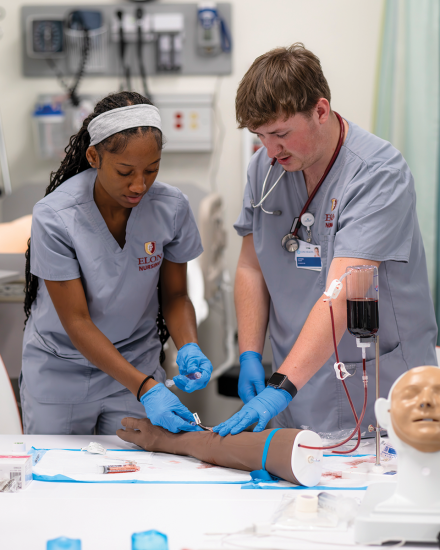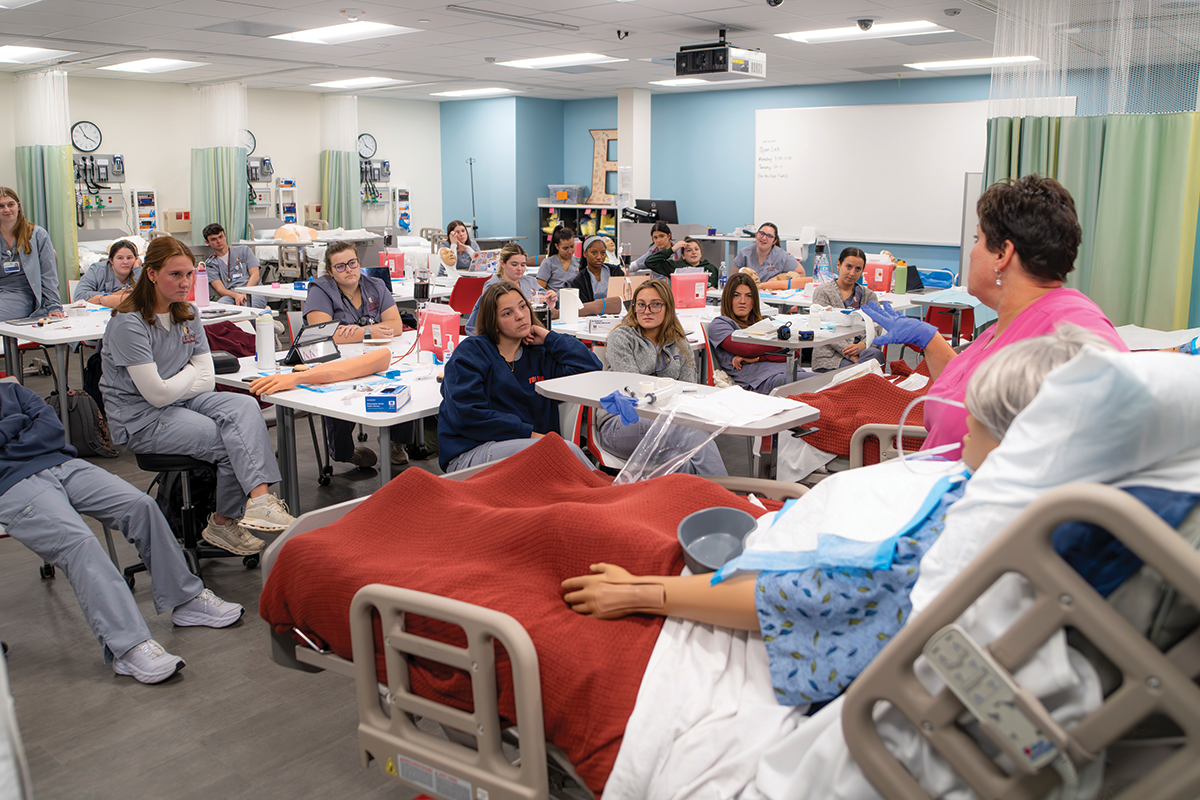Elon’s nursing program cultivates skilled professionals who excel at compassionate, patient-centered care.
Chandler Brayboy’s passion for medicine was cemented when he played a crucial role in his grandfather’s Parkinson’s disease diagnosis. The elder Brayboy’s health began declining when Chandler was in high school, and doctors were struggling to diagnose the problem. But after taking a health science class that covered Parkinson’s, he recognized one of his grandfather’s symptoms as pill-rolling, a distinctive tremor of the hands and an early sign of Parkinson’s.
“I told him, ‘Pop Pop, you know the next time you go to the doctor, you should ask him about Parkinson’s.’ And sure enough, he got diagnosed with Parkinson’s,” Chandler Brayboy says. “It felt pretty cool for him to tell his doctors that his little grandson figured this out. That’s what got me into the medical field, just being able to help. I think helping people is one of my gifts here on Earth.”

A talented football player, Brayboy was drawn to Elon because of the university’s strong commitment to both athletics and academics. He made his mark as a wide receiver for the Phoenix, ranking sixth all-time in receiving yards and fifth all-time in receiving touchdowns at Elon, and earned his bachelor’s degree in exercise science in 2023. But when Elon launched its nursing program in 2021, he saw an opportunity to further explore a career in medicine.
He joined the Accelerated Bachelor of Science in Nursing track, which enables students who already have a bachelor’s degree in another field of study to earn their nursing degree in 16 months, graduating in December. While still focused on football, Brayboy recently passed the National Council Licensure Examination for Registered Nurses (NCLEX-RN). He hopes to eventually apply to Certified Registered Nurse Anesthetist schools and work in an ICU or trauma setting.
“[The nursing program] really changed me,” Brayboy says. “It taught me to be more consistent with my time management, because the program is not going to slow down for you. It’s only going to speed up.”
Housed within the School of Health Sciences, Elon’s nursing program has grown exponentially in a few short years. The first four-year Bachelor of Science in Nursing cohort graduates in May. Nursing ranked No. 8 among intended majors for the Class of 2028, and in February, the program was awarded initial accreditation by the National League for Nursing Commission for Nursing Education Accreditation (NLN CNEA), an organization renowned for the rigorous standards it sets in evaluating the quality of education provided to nursing students at top colleges and universities around the world.
“I am thrilled that Elon’s traditional and accelerated nursing programs have received initial accreditation for the maximum possible term of six years,” says Maha Lund, dean of the School of Health Sciences. “This achievement reflects the dedication, expertise and hard work of our faculty and program leadership.”

Setting a High Bar
The Department of Nursing currently has 208 students enrolled, not including the 18 students who graduated from the accelerated program in December like Brayboy. Both the traditional four-year program and the accelerated 16-month program are based in the Gerald L. Francis Center with 10 faculty members, two staff members and the program director. The first two cohorts of the accelerated program have a 100% first-time pass rate on the NCLEX-RN as well as a 100% employment rate, with graduates now working for health organizations such as Cone Health, Novant Health, Duke Medical Center and Johns Hopkins.
According to the NLN, programs accredited through the CNEA reflect “outcomes that lead to the successful preparation of graduates prepared to enter the nursing workforce” with student-centered learning environments that facilitate professional development and ensure that “program curricula and accompanying teaching, learning and evaluation strategies are up-to-date, evidence-based, flexible and reflective of societal health care needs.”
The NLN CNEA evaluates programs on five standards that reflect cultures of excellence, integrity, diversity and caring related to:
- Establishing program outcomes for benchmarking.
- A mission and governance in alignment with the university’s mission.
- Faculty opportunities for professional development.
- Admission and retention of qualified students.
- Up-to-date curriculum and evaluation processes that reflect societal and health care trends.
The commission will review Elon’s nursing programs again by September 2030.
“Our faculty and staff strive to prepare future nurses who are compassionate and practice at the highest level,” says Associate Professor Cathy Quay, chair of the Department of Nursing. “We achieve this goal through a dedication to teaching excellence and to seeking out ways to continue to improve and grow professionally and personally.
“National accreditation is recognition of all that we do every day to better ourselves and to prepare the future nursing workforce. Every member of the department and our students contributed to this effort. The support of leadership at the School of Health Sciences, the university and departments across campus were essential to getting us to this moment. I hope everyone at the university celebrates, as nursing accreditation will open doors for our students as they pursue excellence in their careers beyond Elon University.”
“[The nursing program] really taught me how to
actually sit down and talk to somebody who’s at the end of their life and have a meaningful conversation with them.” — Chandler Brayboy ’23 & ’24
The university made such a strong impression during the accreditation process that the NLN director recruited Quay to serve on the CNEA’s program review committee, comprising 12 nurse educators who review all programs seeking accreditation through CNEA. This work will allow Quay to see innovative practices in nursing education across the globe while bolstering the education across the globe while bolstering the reputation of Elon’s program.
“We are incredibly proud of Cathy Quay’s appointment,” Lund says. “It speaks to her dedication to excellence in nursing education and the quality of programs within Elon University’s Department of Nursing. She will be a valuable asset in shaping accreditation standards that ensure the highest quality of nursing programs nationwide.”
Building New Pathways
Establishing a distinctive nursing program is a key component of the Boldly Elon strategic plan, which launched in 2020 just before the COVID-19 pandemic changed the world. Communities and health care facilities across the country were already challenged in finding enough nurses to meet the high demand for their skills and care, and the pandemic pushed that demand even higher. In addition to the demand within the health care field and the vision outlined in Boldly Elon, the BSN and ABSN degrees were developed based on feedback from students about programs they would like to see at Elon.
“It was clear that not only prospective students but our current students were interested in moving on to nursing careers after they left Elon,” former Dean of the School of Health Sciences Becky Neiduski said before the program’s launch in 2021. Though planning for the nursing degree programs began well before the pandemic, seeing nurses work on the front lines to combat the public health crisis strengthened the university’s sense of purpose in launching this new educational opportunity. After a new nursing program was included in Boldly Elon, the health sciences team hit the ground running and got to work.

Elon developed two tracks to earn a nursing degree with extensive input from not just those on campus, but from the broader community and health care industry. The four-year BSN program allows students to satisfy all of their Elon undergraduate degree requirements while completing all nursing prerequisites and the 65-hour nursing curriculum. During their first two years, these nursing students focus on core courses and prerequisites before moving into the nursing curriculum.
Additionally, the university created the selective merit-based Nursing Fellows program for undergraduates pursuing a four-year nursing degree. Students who are selected for the program spend four years working closely with faculty mentors exploring the many opportunities within the field of nursing and identifying ways to advance health equity in local and global communities.
The ABSN program is for those who have already earned a bachelor’s degree in another field of study. During the intensive 16-month program, students complete the 65-credit-hour nursing curriculum while also completing 540 clinical hours. Both programs prepare students to sit for the NCLEX-RN to become licensed registered nurses, and guide students toward five key outcomes through experiential learning and global engagement opportunities:
- Use the nursing process to provide ethical, culturally sensitive and compassionate client-centered care to diverse populations in various settings.
- Promote safety by utilizing evidence-based practice and quality improvement to deliver safe and effective care.
- Collaborate with clients, nursing and interprofessional teams to provide quality holistic care.
- Integrate informatics and technology to promote the art and science of quality nursing care.
- Expand knowledge of self-care and lifelong learning to enhance personal well-being and professional growth.
Part of what attracted Quay to the program is the unique curricular design around advancing health equity. “There are three succinct courses that scaffold each other and introduce concepts that focus on health care disparities and health inequities,” she says. “We look at how nurses provide care that’s going to help to address these health disparities we see in various populations.”

Where Knowledge Meets Care
Nursing students experience a distinctively Elon program through courses such as Health Care Relationships, which focuses on disparity, diversity, equity and inclusion. In the Crucial Conversations in Health Care course, students learn how to effectively and empathetically communicate about difficult topics, such as death and dying. The programs also include an emphasis on health informatics, given how the health care industry has expanded its use of data to improve care and increase access for larger populations.
“I struggled with how to interact with patients who were dying or in hospice, but they really taught me how to actually sit down and talk to somebody who’s at the end of their life and have a meaningful conversation with them,” Brayboy says.
Elon’s nursing programs emphasize holistic, patient-centered care through initiatives like The Puzzle Project. Developed by Assistant Professor of Nursing Jeanmarie Koonts with support from the Maker Hub and a grant from the Center for the Advancement of Teaching and Learning, the project begins with a blank puzzle shaped like a human body. Each week during the Assessment of Health and Wellness for Nursing Practice course, students learn to assess a different body system and receive the corresponding pieces of their puzzles. They also explore factors influencing patient care like culture, diet, dress, rituals and faith practices. The project culminates with students decorating their puzzles to reflect their own identities and presenting them to the class.
“[The mannequin’s] chest rises and you can hear them breathe. They blink. There’s a microphone that can talk through them from another room. You can feel their pulse. There are lots of different functions to help you practice like it was a real person.”
— Lathan Rubant ’26
“Ultimately, I believe excellent nursing care is holistic, compassionate and evidence-based,” Koonts says. “It requires cultural and spiritual awareness and the ability to view care through the patient’s eyes.”
Nursing students also expand their intercultural competence through study abroad experiences. During Winter Term, 24 nursing students spent 18 days in Cuba as part of their Healthcare, Culture and Language course. Students were divided into five groups with different focuses, including pediatrics, maternity, end-of-life, public health and chronic disease. They visited facilities related to those areas while bringing donations that might assist health care staff or patients.
“I was excited to experience health care in a different country,” Meredith Korwan ’26 says. “I was curious and eager to learn about different systems and experience a different culture with other nursing students by my side.”
In building the nursing program, Elon leveraged faculty and facilities resources already in place for the School of Health Sciences graduate programs to ensure students have ample opportunities for practical training. Through the Client and Standardized Patient Program, students gain valuable hands-on experience with clients from the community who have medical conditions as well as standardized patients, who are individuals trained to portray a specific medical case or condition. A state-of-the-art skills lab includes mannequins that can be controlled remotely by a coordinator who can program them to display certain conditions or vital signs, with faculty observing through a two-way mirror.
“[The mannequin’s] chest rises and you can hear them breathe. They blink. There’s a microphone that can talk through them from another room. You can feel their pulse. There are lots of different functions to help you practice like it was a real person,” Lathan Rubant ’26 says. “As we progress through the program, we’ll give them IVs, watch their stats. They’ll really be functioning as a person.”
The university also has hundreds of relationships with clinical sites locally and statewide where Elon nursing students complete clinical hour requirements in a wide range of medical specialties, putting the skills gained in the classroom and lab into practice.
“You never know what patient you’re going to get or how the patient is going to be feeling that day. But we’re always just eager to learn,” says Kalia Lilly ’26, a Nursing Fellow and Odyssey Program scholar. “We shadow our staff nurses, and we are just waiting for an opportunity to jump in and help wherever we can. Being able to do that in clinicals is one of the most exciting parts about being a nursing student, to really apply the skills we’ve been mastering and work with real patients.”
Elon President Connie Ledoux Book says preparing future health care professionals is about more than just classroom learning — it’s about creating an engaged, hands-on experience rooted in service and patient-centered care. She envisions Elon’s nursing graduates stepping into the field as confident leaders, compassionate advocates and skilled practitioners, ready to make a meaningful impact in hospital rooms and beyond.
It’s a sentiment shared by students as well.
“Everything we’ve gotten to do in clinicals we’ve learned during our lectures, and we’ve been able to practice in the lab,” Lilly says. “The nursing program is always focused on making sure we are truly learning and feel confident in the skills that we’re going to need in the real world post-graduation.”



